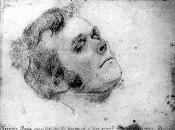Alexander Pearce was born to a Roman Catholic family in County Monaghen, Ireland. Throughout his early life, Pearce worked odd jobs as a farm labourer and was arrested for the theft of six pairs of shoes in 1819. He was subsequently sentenced to several years of penal transportation to Tasmania.
Pearce arrived in Tasmania in February, 1821 and was sentenced to work duty, receiving numerous floggings and lashings for misdemeanors. In March, 1822, Pearce managed to escape into the Tasmanian wilderness and remained at large for three months. He was soon recaptured and the Hobart magistrate sent him to the newly established Macquarie Harbour Penal Station on Sarah Island. Pearce was set to work on cutting and transporting timber.
The terrain of Sarah Island and Tasmanian’s west coast is amongst the most rugged in the country and the penal establishment contained only the bare essentials for living. After six weeks of hard labour, Pearce and several other convicts instigated an escape plan. The plan involved stealing a boat and heading for the Australian mainland or another island but complications arose that forced the men to flee into the unexplored bushland of Tasmanian’s west coast.
For over a week the party wandered through the dense forests and when confronted with starvation turned to cannibalism. One of the other convicts, Robert Greenhill, appointed himself leader and the party decided to kill and eat one of their members. After witnessing and participating in this display,two of the escapees decided to head back to the penal station but died from exhaustion shortly after their return.
The remaining five men headed east towards the settled areas of Tasmania. After a few weeks of traversing through the wilderness, the groups’ numbers dwindled to three. Pearce was saved from being the next victim as one of the other men was bitten by a venomous snake and was soon put down. The two surviving men then continued the journey.
For over a week the pair struggled on while becoming increasingly mindful of the other. One night, Pearce waited until Greenhill fell asleep and then proceeded to kill him. Now the sole survivor, Pearce eventually made it the settled areas of Tasmania where he joined convicts in stealing sheep and robbing nearby farms.
Pearce and his new associates were caught after several months and stood trial in Hobart under magistrate Revered Robert Knopwood who, not believing his tales of cannibalism, ordered that he be returned to the work camps on Sarah Island.
Pearce managed to escape again from Sarah Island in 1823. Thomas Cox, a young convict, accompanied Pearce. The two men reached the mainland and followed the coastline north. After eleven days, Pearce was captured with human flesh found in his pockets.
In June 1824, Pearce was trialled in Hobart’s Supreme Court and found guilty of murdering and cannibalising Thomas Cox. Pearce confessed that he fell into a rage and killed Cox after hearing that the young man could not swim. This still did not explain why Pearce proceeded to eat Cox as other food was found on him during his arrest.
At 9am on 19 July 1824, Alexander Pearce was hanged at the Hobart Town Gaol. He was the first criminal and cannibal to be executed under Tasmania’s new Supreme Court. Because of his unique affliction, Pearce’s corpse was taken and later dissected for scientific purposes.
See Full Austlit entry.


